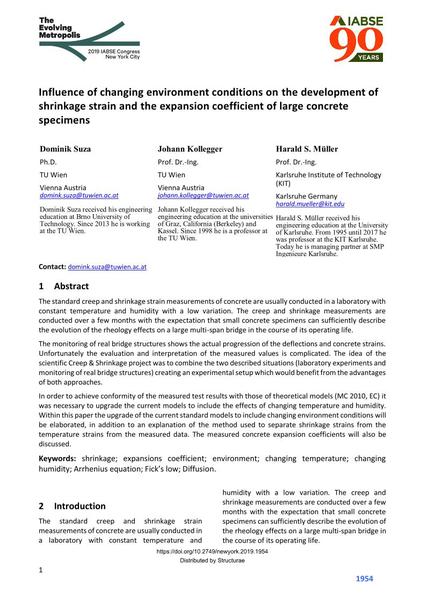Influence of changing environment conditions on the development of shrinkage strain and the expansion coefficient of large concrete specimens

|
|
|||||||||||
Bibliographic Details
| Author(s): |
Dominik Suza
(TU Wien)
Johann Kollegger (TU Wien) Harald S. Müller (Karlsruhe Institute of Technology (KIT)) |
||||
|---|---|---|---|---|---|
| Medium: | conference paper | ||||
| Language(s): | English | ||||
| Conference: | IABSE Congress: The Evolving Metropolis, New York, NY, USA, 4-6 September 2019 | ||||
| Published in: | The Evolving Metropolis | ||||
|
|||||
| Page(s): | 1954-1958 | ||||
| Total no. of pages: | 5 | ||||
| DOI: | 10.2749/newyork.2019.1954 | ||||
| Abstract: |
The standard creep and shrinkage strain measurements of concrete are usually conducted in a laboratory with constant temperature and humidity with a low variation. The creep and shrinkage measurements are conducted over a few months with the expectation that small concrete specimens can sufficiently describe the evolution of the rheology effects on a large multi-span bridge in the course of its operating life. The monitoring of real bridge structures shows the actual progression of the deflections and concrete strains. Unfortunately the evaluation and interpretation of the measured values is complicated. The idea of the scientific Creep & Shrinkage project was to combine the two described situations (laboratory experiments and monitoring of real bridge structures) creating an experimental setup which would benefit from the advantages of both approaches. In order to achieve conformity of the measured test results with those of theoretical models (MC 2010, EC) it was necessary to upgrade the current models to include the effects of changing temperature and humidity. Within this paper the upgrade of the current standard models to include changing environment conditions will be elaborated, in addition to an explanation of the method used to separate shrinkage strains from the temperature strains from the measured data. The measured concrete expansion coefficients will also be discussed. |
||||
| Keywords: |
shrinkage environment expansions coefficient changing temperature changing humidity Arrhenius equation Fick’s low Diffusion
|
||||
